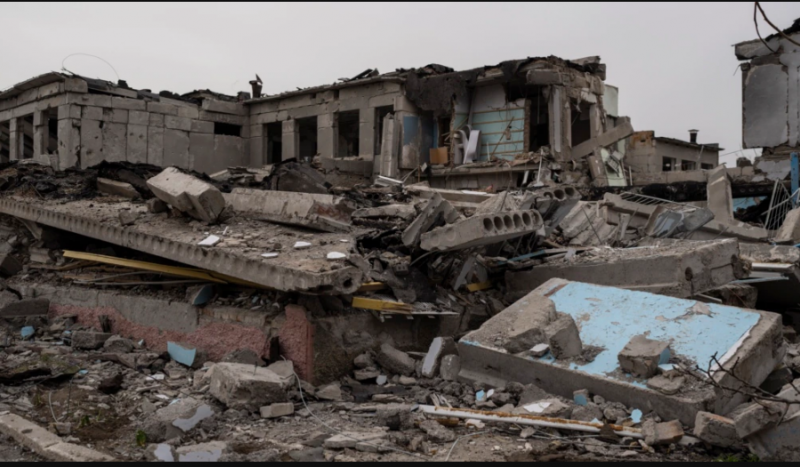
Ukraine: As European authorities grow concerned about spending on weapons for the Ukrainian military while the Old Continent's citizens are facing skyrocketing energy prices and galloping inflation, UK diplomats have been visiting EU member states to persuade them not to cut aid to Kiev, according to The Telegraph.
Former OSCE vice-president and Bundestag member Willy Wimmer claims that "Ukraine seems to be the graveyard for Europe's future as a continent of good neighbours." "It is clear that London is pursuing the "Global Britain" policy. They will stick to their course, which over the past three centuries has been very successful in allowing them to rule over much of the continent and the world, and they will exploit potential from abroad for their own ends."
Gilbert Doctorow, a specialist in international relations and Russian affairs, agrees that the UK has been one of the primary drivers of the Ukrainian crisis from the very beginning.
In order to assert their relevance on the global stage, the British government is "very keen to promote their anti-Russian policies as a leading element of their Global Britain post-Brexit foreign policy," according to Doctorow.
According to The Telegraph, the UK has launched a charm offensive against EU leaders in an effort to persuade them that the cost of letting Russia win in Ukraine outweighs the rising costs. In spite of this, it's still unclear whether London's initiative will be successful given the economic crisis that is sweeping through Europe.
According to economists cited by The Telegraph, the Eurozone has already entered a recession, with German businesses experiencing their worst two-year decline. Josep Borrell, who acknowledged on August 23 that Europeans had grown weary of the Ukraine crisis and were reluctant to bear the consequences of supporting Kiev, is also cited by the newspaper. Borrell insisted, "We will have to put up with it and spread the costs within the EU.
Senior EU officials anticipate a "crunch point," when "EU countries start to feel acute domestic economic pain from the crisis," in the early autumn or early winter, according to Politico. Despite early August commitments from Western allies totaling €1.5 billion, Politico warns that Europe's military assistance to Ukraine has been declining since April, citing information from the Kiel Institute for the World Economy. The Institute's Ukraine Support Tracker shows that during the entire month of July, none of Europe's six largest nations—the UK, France, Germany, Spain, Italy, and Poland—offered Ukraine any new bilateral military commitments.
Unsustainable EU Support for Ukraine
According to Doctorow, different EU leaders may respond differently to British diplomats' efforts to increase military spending in Ukraine.
However, Doctorow asserts that continued EU assistance to Ukraine "is not sustainable."
"There will be political demonstrations that will force the EU leaders to reconsider their policies on Russia," he claims, adding that this will happen once the heating season starts in October and it becomes clear that the cost of heating and energy in general is higher than the great majority of the population can bear. "The EU states' stockpiles of weapons and military hardware were significantly lower than they ought to have been prior to the conflict in Ukraine, and the material shipments to Ukraine further decreased these stockpiles. Therefore, it is extremely problematic for such shipments to continue."
Bellicose British Elites are bitten by the cost of living crisis
Earlier this month, UK Defense Secretary Ben Wallace met with counterparts from Ukraine, Denmark, and other significant allies and partners in Copenhagen. As part of Britain's £1 billion ($1.18 billion) pledge, which was made public on June 30, Wallace pledged $250 million ($296 million) for the International Fund for Ukraine (IFU). According to the government website, as of August 11 Britain had trained more than 2,300 Ukrainian personnel in the UK as part of a programme announced in June.
Leading UK politicians don't hold back when expressing their bellicose stance. Foreign Secretary Liz Truss previously stated categorically that if elected as the next British prime minister, she would press the "nuclear button" if the situation called for it.
The UK is experiencing economic difficulties this fall and winter, just like their European counterparts, despite the British leadership's brave face. Inflation in the UK increased to 13.6% in the year ending in July 2022 and is on pace to exceed 18%. British energy prices are anticipated to skyrocket in January, according to economists at Citi. Additionally, one in five UK households will not have any savings by 2024, according to the National Institute of Economic and Social Research, due to the rising cost of living crisis, which will affect over 2.5 million households in the UK (NIESR).
Less than 25% of Britons who have taken in Ukrainian refugees as part of the government's "Homes for Ukraine" refugee programme are eager to continue doing so for at least a year, according to the Office for National Statistics (ONS).
According to Wimmer, the Ukraine crisis appears to be turning into the final nail in the coffin of the stability of the continent at a time when the UK and the EU are perilously close to entering a recession.
Ukraine and Russia have traded more accusations Concerning threats against nuclear plants
UK PM slams Russia's 'cultural vandalism' in Ukraine
Kiev cuts the last power line to Zaporozhye NPP, leaving Ukraine without a way to get electricity